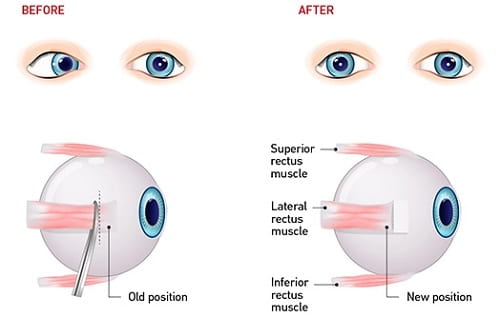When the eye muscles become weak and the eyeball concentrates in a new direction than the rest of the body, this is referred to as squinting. In a healthy person, their vision is concentrated on the center portion of the pupil. The most difficult part of having a squint eye is focusing on a thing. One eye may be normal and concentrated in the center, while the other may be loosely linked to the rest of the body.
It is the most straightforward ailment, which is also known as lazy eye in broad terms, and it is simply treatable. There are several possible causes, one of which is weaker eye muscles; another is a neurological disorder in which there is a deficiency in the portion of the brain that governs eye movement.
One of the following two possibilities could be producing the squint: The most common explanation for this is a lack of strength in the ocular muscles. However, there is another possibility for the underlying origin of the illness, which is a weakening in the brain area that regulates eye movement.

When treating a simple squint issue, glasses or contact lenses are initially prescribed, and eye patches may also be employed. A procedure in which the typical eye is patched with a patch & the afflicted eye is solely focused on objects, thus improving vision, is known as eye patch therapy.
It is a worthwhile technique, but it is time-consuming, and the effects are only seen after a few years. Surgery is the most effective treatment for this eye condition since it helps to rectify the placement of the eyeball while also improving eyesight.
Depending on the technology utilized by the Medical Centre and the other resources needed for the surgery, the price of Squint Eye therapy in India can range from Rs 25,000 to Rs 1 Lakh.
As part of this procedure, the muscles that flex the eye are tightened so that they lose their flexibility, & the focus of the eyeball is adjusted and shifted closer to the center of the pupil, as described above. In other circumstances, there are flaws in both eyes, and in those cases, both eyes must be operated on. This operation has been conducted for a long period, and as the years have passed, it has become more refined and equipped, resulting in a result rate of 100 percent.
Even children are encouraged to have this procedure. If the patient is really small, it is preferable to wait until they are a bit older before having the procedure. However, do not force it on an older person because the eye muscle begins to react to the distorted vision, making it extremely difficult to correct it back to normal. It is recommended that you get the operation as soon as possible after learning about it.
Over the years, this operation has been refined to the point that it is completely safe with only a few side effects to report. Itchiness in the eyes during the first few days is typical and should not be taken too seriously.
Q 1. Is Squint Eye a cosmetic problem?
Squint eye is not a cosmetic problem but is associated with decreased vision. It causes loss of binocular vision and can cause loss of fine stereopsis and your peripheral visual field.
Q 2. Can my squint eye issue be cured?
Yes, squint eye disease can be cured properly. We advise you to have a regular diagnosis of your eye if you feel inconvenience so that it can be identified at an early age and corrected as soon as possible. Any delays in treating squint eye can cause vision complexity and more.
Q 3. Is squint eye a form of disability?
No, squint eye is not a disability and is more of an alignment issue with your eye which can be treated and made correct.
Q 4. Does squint eye increase with age?
Squint eyes in most cases are generally developed in the first three years of your birth. They do not generally increase with age but if left untreated can cause great inconvenience and affect your vision.
Q 5. Is squint surgery painful?
No, squint surgery is not at all painful. The patient may feel a bit of discomfort after the procedure which will die down within a few hours and they can get going with their normal routine life.
Q 6. Is squint eye genetic in nature?
Squint eye has been recognized as a genetically hereditary condition and is likely to be passed from parents to their kids.